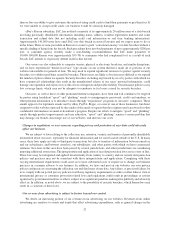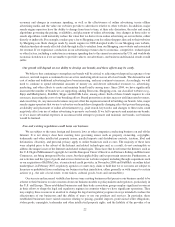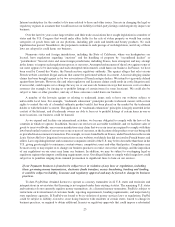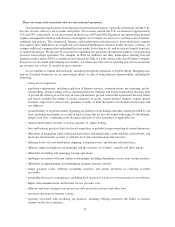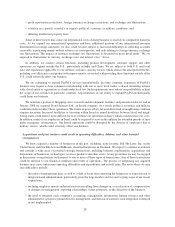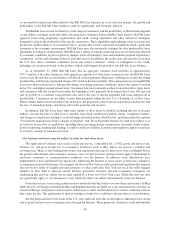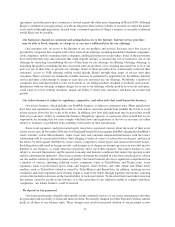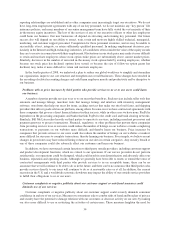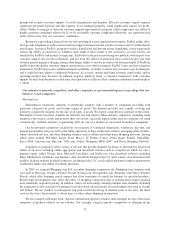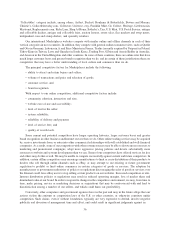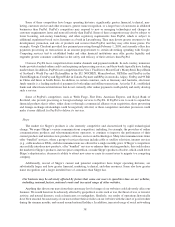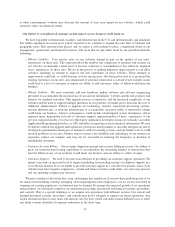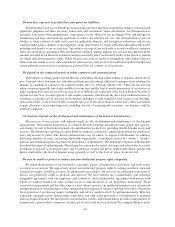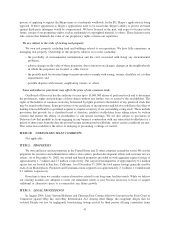eBay 2008 Annual Report Download - page 39
Download and view the complete annual report
Please find page 39 of the 2008 eBay annual report below. You can navigate through the pages in the report by either clicking on the pages listed below, or by using the keyword search tool below to find specific information within the annual report.impair the growth of ecommerce and our brands, and could diminish our opportunity to derive financial benefit from
our activities. The U.S. federal government’s moratorium on state and local taxation of Internet access or multiple or
discriminatory taxes on ecommerce was extended through November 2014. This moratorium does not prohibit
federal, state, or local authorities from collecting taxes on our income or from collecting certain taxes that were in
effect prior to the enactment of the moratorium and/or one of its extensions.
In conjunction with the Streamlined Sales Tax Project — an ongoing, multi-year effort by U.S., state, and local
governments to require collection and remittance of distant sales tax by out-of-state sellers — bills have been
introduced in recent years in the U.S. Congress to overturn the Supreme Court’s Quill decision, which limits the
ability of state governments to require sellers outside of their own state to collect and remit sales taxes on goods
purchased by in-state residents. Such legislation may be considered by the U.S. Congress as a way to enable states to
increase sales tax revenues and help address significant state budget difficulties caused by the economic downturn.
The adoption of any legislation overturning the Quill decision that lacks a robust small business exemption would
harm our users and our business.
We do not collect taxes on the goods or services sold by users of our services. One or more states or the federal
government or foreign countries may seek to impose a tax collection, reporting or record-keeping obligation on
companies that engage in or facilitate ecommerce. Such an obligation could be imposed by legislation intended to
improve tax compliance (and legislation to such effect has been discussed in the U.S. Congress, several states, and a
number of foreign jurisdictions) or if an eBay company was ever deemed to be the legal agent of the users of our
services by a jurisdiction in which eBay operates. In July 2008, the Housing and Economic Recovery Act of 2008
(H.R. 3221) was signed into law. This law contains provisions that require companies like PayPal to report to the
IRS information on payments received by some of our customers. The legislation, effective for payments received
after December 31, 2010, will require PayPal and similar companies to report to the IRS U.S.-based customers who
receive more than $20,000 in payments and more than 200 payments in a year. This law will require PayPal to
request tax ID numbers from U.S. users and track payments by tax ID number. This requirement may decrease seller
activity and harm our business. One or more other jurisdictions may also seek to impose tax-collection or reporting
obligations based on the location of the product or service being sold or provided in an ecommerce transaction,
regardless of where the respective users are located. Imposition of a discriminatory record keeping or tax collecting
requirement could decrease seller activity on our sites and would harm our business. Foreign authorities may also
require eBay to help ensure compliance by our users with local laws regulating professional sellers, including tax
requirements. In addition, we have periodically received requests from tax authorities in many jurisdictions for
information regarding the transactions of large classes of sellers on our sites, and in some cases we have been legally
obligated to provide this data. The imposition of any requirements on us to disclose transaction records for all or a
class of sellers to tax or other regulatory authorities or to file tax forms on behalf of any sellers, especially
requirements that are imposed on us but not on alternative means of ecommerce, and any use of those records to
investigate, collect taxes from, or prosecute sellers, could decrease seller activity on our sites and harm our business.
We pay input VAT on applicable taxable purchases within the various countries in which we operate. In most
cases, we are entitled to reclaim this input VAT from the various countries. However, because of our unique business
model, the application of the laws and rules that allow such reclamation is sometimes uncertain. A successful
assertion by one or more countries that we are not entitled to reclaim VAT could harm our business.
We continue to work with the relevant tax authorities and legislators to clarify eBay’s obligations under new
and emerging laws and regulations. Passage of new legislation and the imposition of additional tax or tax-related
reporting requirements could harm our users and our business. There have been, and will continue to be, substantial
ongoing costs associated with complying with the various indirect tax requirements in the numerous markets in
which eBay conducts or will conduct business.
The current regulatory environment for Voice over Internet Protocol (VoIP) is uncertain, and Skype’s
business could be harmed by new regulations or the application of existing regulations to its products.
The current regulatory environment for VoIP is uncertain and rapidly changing. Skype believes that its Internet
communications products are currently subject to few, if any, of the same regulations that apply to traditional
telephony and VoIP-based telephone replacement services. VoIP companies are generally subject to different
31


